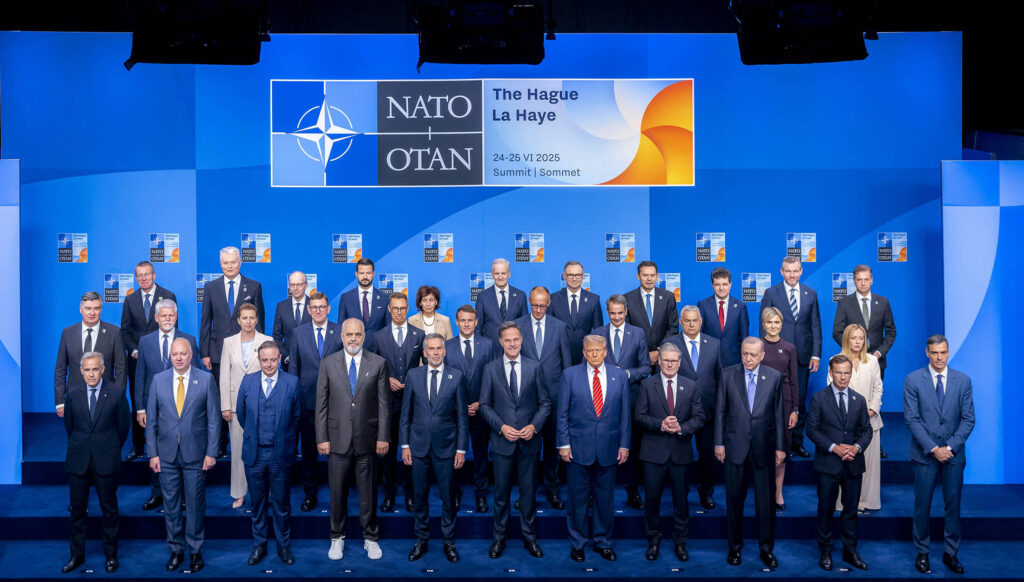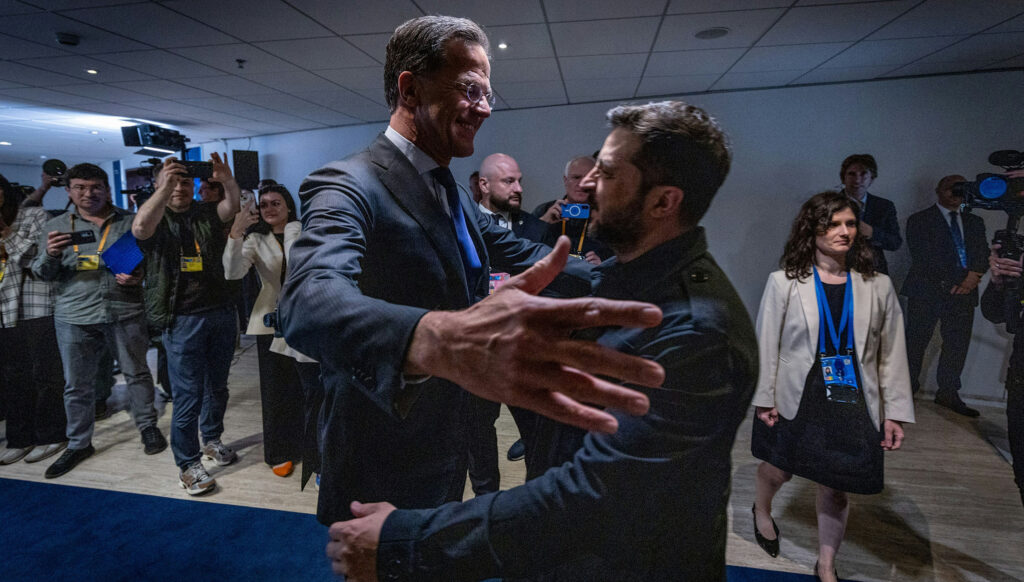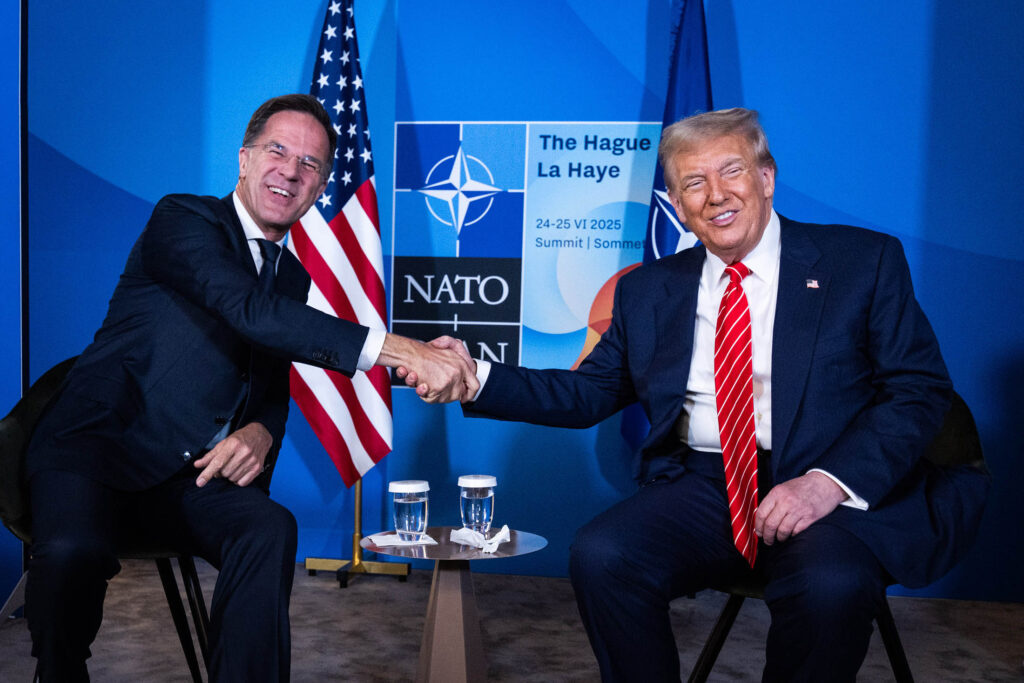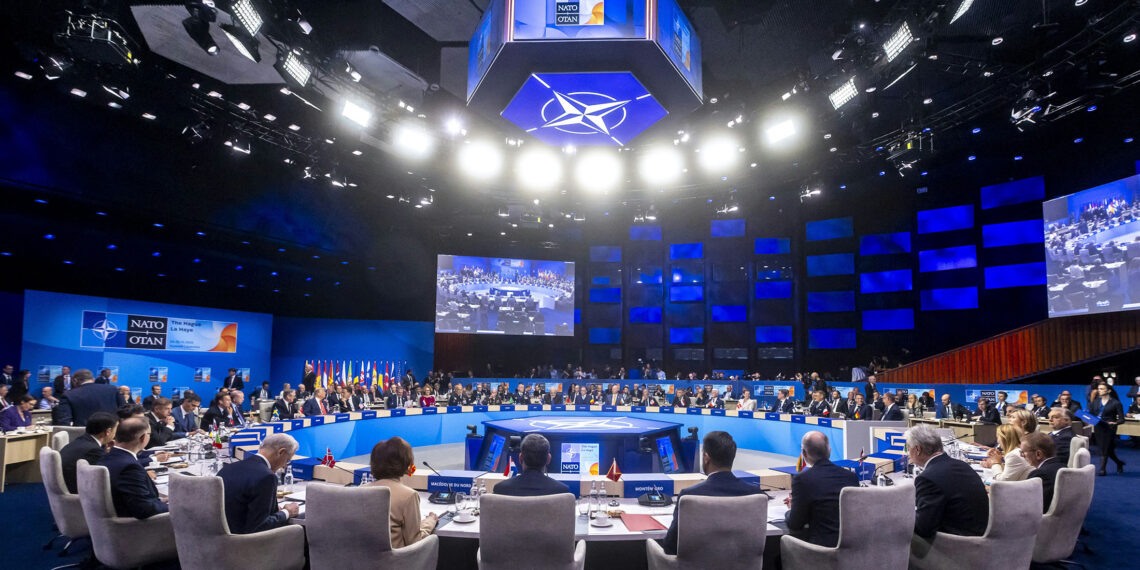At this year’s NATO Summit, alliance members made headlines by committing to spend at least 5% of their GDP on defense, a move that signals a dramatic recalibration of transatlantic priorities. Yet, behind the numbers and press releases, the real story is more complicated.
Former U.S. Ambassador to NATO Kurt Volker recently sat down with Independence Avenue Media’s Kartlos Sharashanidze in Washington to break down what’s truly at stake. Volker, who also served as U.S. special envoy for Ukraine negotiations during the first Trump administration, sees the new defense spending target less as saber-rattling and more as a pragmatic response to the ongoing war in Ukraine – a conflict that has forced Europe to rethink its own security and, paradoxically, left both Ukraine and NATO stronger than before.
From the alliance’s pointed silence on enlargement to the challenge of countering Russian propaganda, Volker argues that NATO’s unity is no accident. He describes the decision to refrain from open debate on expanded membership as a tactical move to maintain coalition unity, not a sign of retreat. The future of European security, he contends, depends on a stable, sovereign Ukraine – and on a NATO that can adapt to new threats, whether from Moscow or within its own ranks.
The following interview, conducted on July 1, 2025, has been edited for length and clarity.
Independence Avenue Media Managing Editor for International Coverage Kartlos Sharashanidze: Let’s start with “big win,” a key summit outcome: Everyone’s talking about NATO’s decision to raise defense spending from 2% to 5% by 2035 – much more than Russia and China’s spending. But what does this really say about how NATO sees its future and the threats it’s preparing to face?
Former U.S. Ambassador to NATO Kurt Volker: Well, thank you very much for having me. And I wish Independence Avenue Media all the best in your new venture here.
I think this was a very successful NATO summit. The number one issue is what you mentioned: Countries agreeing to spend 5% of GDP on defense.
And to unpack what that means – well, first off, it is a better-balanced alliance than it had been, and that imbalance had led to a lot of political frustration in the United States, particularly with President Trump and his voting base, who saw this as very unfair. But it wasn’t only them. If you think back to the Obama administration, people complained about European defense spending. Same thing in the Bush administration. So, the first thing is that this achieves a better and more fair balance of responsibilities within the alliance, which is going to keep the U.S. committed to NATO. And President Trump pretty much said that at the summit.
In addition to that, it’s a recognition by our European allies that they actually face much bigger threats on the European continent now, and they need to actually invest in defense capabilities and defense industries if they want to be protected against those threats. It’s a recognition that that is out there. To be very clear, this would not have happened if Russian President Putin had not launched a full-scale invasion of Ukraine in February of 2022. This was a wake-up call for Europe. But contrary to defeating Ukraine and dividing Europe, Putin ended up with a stronger Ukraine – a sovereign and independent Ukraine – and a stronger Europe that has decided to spend more on defense as a result of his actions.
Sharashanidze: Do you think the increased spending could lead to a new arms race with Russia or China?
Volker: Well, no. This increase is a response to what Russia and China are already doing. Russia has launched this massive invasion; They poured money into their defense industry, into their military. They’re building up all these capabilities. So rather than viewing this as provoking an arms race, I would look at this as a necessary response to what Russia has already done. And it may end up deterring Russia, when a weak position for Europe and NATO would not.

Sharashanidze: NATO leaders said President Trump’s vision led the summit. What do you think this means for U.S.-NATO ties going forward?
Volker: Well, as I said, I think it’s better balanced, and that makes it more politically sustainable. So that is very important. We don’t have this finger-pointing and recrimination that we had before. In addition to that, it’s going to allow the U.S. to focus on global threats as much as we do, and Europe will take a larger responsibility within Europe for European security.
It also was clear that Europe was trying to make the summit a success for President Trump. If you think back to 2018, Trump came in and blew up that summit over the issue of defense spending, very upset with NATO, threatened that we wouldn’t support Article 5, would not defend countries if they were attacked, if they hadn’t paid their share. That is completely different now. President Trump, as he was leaving, said that he came away with a very different opinion of NATO, that these people love their countries, that the U.S. will help defend those countries. So that is a marked change. And I think that bodes well for the future of NATO and the future of U.S. and European mutual commitment to NATO.
Sharashanidze: The summit declaration didn’t mention enlargement – was this a proverbial “big win” for Russia? Does this mean NATO is giving up on enlargement?
Volker: I know that Russia would like to portray this as a big win, but the reality is [that] it is not. What you have here is for the past two NATO summits before this one, you had language that was very supportive of Ukraine’s… future in NATO, but with no real commitment to moving ahead. That has not changed. Same idea, same language from the past. That has not been changed. It takes a consensus at NATO to undo something or to change something. There’s no consensus to do that.
So, rather than focusing on something that is not immediate and where there might have been differences of nuance among allies, we just put it aside. We say, “it’s not happening right now anyway. Let’s not focus on that and not air any public differences but rather show unity among NATO Allies.”
Now, with respect to Georgia, I think it was to Georgia’s advantage not to be mentioned as well. [If] it had, I’m quite sure there would have been a differentiation between Georgia and anyone else who aspires to NATO membership, because the Georgian government’s actions over the past few years have really pulled Georgia away from NATO.

Sharashanidze: Could you please help us understand why the enlargement is important for NATO’s security. Is NATO safer when it expands to countries like Ukraine, Georgia, or when it stays the same size to avoid conflict?
Volker: Well, this is it. You put your finger on it. It’s a balancing act. If Ukraine were to become a member of NATO today, NATO would take on an obligation to fight Russia, to defend Ukrainian territory. So, NATO countries don’t want to fight Russia right now. They don’t want to expand this war to an all-NATO-Russia war.
However, if there’s a ceasefire, if the war is stopped, then it’s in everybody’s interest to make sure it doesn’t start again, and the best way to do that is to bring Ukraine into NATO so that Putin knows if he starts this war again, he’s now going to face all of NATO, and it’s going to be much worse for Russia. So that’s how you try to then reinforce peace by bringing Ukraine in.
And moreover, I think Europeans know, probably better than the American administration right now, that if Putin is allowed to win in [Ukraine], he will not stop there. And President Trump said this in The Hague at the NATO Summit. He said he knows Putin would not stop there. But he has laid claims to territory of the former Russian Empire, which includes the Baltic states, includes Finland, which includes part of Poland, which includes part of Kazakhstan, which includes the country of Georgia. So, he has laid far more expansive claims of Russian territory than he has achieved today. So, if Ukraine is defeated and incorporated into a Russian Empire, we’re going to face a wider war. Whereas if Ukraine is sovereign, independent and secure, that is the principal and most important bulwark against further Russian expansion.
Sharashanidze: Last question about enlargement. Some Georgian policymakers say that NATO’s open-door policy is, in fact, a closed door. Would you agree with that view?
Volker: No. And I think people who think that are missing the point. What President Trump has emphasized is fairness. He wants European allies to pay their fair share and bear their fair share of the burden of security. He felt the United States was doing too much. That is different than saying he doesn’t believe in enlarging NATO. If a country can contribute to NATO and to European security and help prevent war, there’s no reason why he would be against that. So, I think they’re misinterpreting what they’re hearing from President Trump.
NATO European allies’ steps to increase defense spending is a great start. It doesn’t guarantee further enlargement, but it certainly makes it more imaginable than it was before.
Sharashanidze: With Russia named as a major threat, how should the U.S. and NATO balance diplomacy and pressure on Russia?
Volker: Well, I would argue that we are not doing a good job of that right now. We are giving too much emphasis to dialogue and talk and urging Putin to negotiate, and not enough emphasis to setting the terms, setting the conditions on the ground that will force Putin to negotiate.
Right now, Putin feels very comfortable. He is not feeling any pressure from the West. So that means he’s not going to negotiate in any good faith. We see that in his actions every day. Just two nights ago, he launched the largest single air raid against Ukraine from this entire three-year, four-month conflict. So, he is clearly not interested or feeling any need to talk. So, we need to increase the pressure on Russia through tightening sanctions – particularly secondary sanctions – and also through demonstrating that there will be a continued supply of arms and ammunition for Ukraine for as far as the eye can see. And if we can do that, then we’re sending Putin a message that it’s only going to get worse for him, so he had better stop the war now.
Sharashanidze: Do you have expectations that we will see new sanctions against Russia from this administration?
Volker: Yes, I do. [But] we are not there yet.
President Trump clearly does not want to do that. He wants to get to a point where there’s an agreement with Putin, and we can move forward. So, it’s not his goal to have these sanctions – we heard that from Secretary of State [Marco] Rubio in The Hague. He expressed that, well, we’re not there yet. We still want to focus on negotiations. But I think a lot of people know that that’s not going to work. Only continued pressure on Russia will actually lead them toward negotiations.

So, I expect that before the end of July, you’ll have the Senate and the House pass the secondary sanctions legislation, which will strengthen Trump’s hand in negotiations. He would have the legal authority, the ability to impose those secondary sanctions and put [a] greater squeeze on Russia’s economy. And I think that he, as I said, doesn’t want to do it. But if he’s getting pressure from Republicans in Congress and Putin continues to ignore the calls for a ceasefire, he may feel that he has to do it in order to get to that ceasefire that he wants.
Sharashanidze: When it comes to threats, the summit declaration didn’t mention China alongside Russia. Why was China left out?
Volker: I think President Trump wants to keep the focus on Europe doing its part for European security. This is what this 5% was about. The feeling that the United States was bearing too much of the load of security for Europe when Europe was not doing [so] itself. He wanted to focus on the threat to Europe [that] is coming from Russia, and [emphasize his conviction] it’s Europe’s responsibility to spend more to deal with that – and [with which] the U.S. can help.
Coming to China, I think President Trump is looking at that through a very different lens, where he recognizes that [it] is the single biggest threat to the world and the United States directly, the only peer competitor that we’re going to face. But he wants to try to manage that somewhat differently. He wants to see if he can maintain a relationship with China while building up American capacities to deal with China and just putting out language that sounds menacing or sounds like we recognize China is a threat without putting anything behind it. [In other words], I think he felt better putting the focus on Europe and dealing with China separately.


